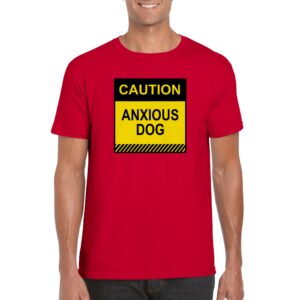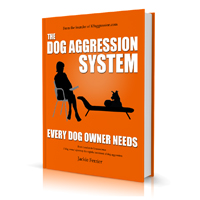Your cart is currently empty!
MEDICATIONS USED FOR TREATING DOG AGGRESSION

When dealing with dog aggression, medication can be an important part of a comprehensive treatment plan. This guide offers an overview of the medications commonly used to manage aggression in dogs, clarifying how they work and what to consider before starting treatment.
In this article
Understanding the Role of Medications
Medications are not a cure for aggression but can be prescribed to address underlying conditions that may contribute to aggressive behavior. Medications can help reduce anxiety and fear, making it easier for your dog to learn and adapt to behavior modification strategies.
How Medications Impact the Brain
Each medication affects the brain differently. Many work by altering the release of neurotransmitters, which are chemical messengers that facilitate communication between brain cells.
Research suggests that the benefits of some medications may be due to neurogenesis, which is the creation of new brain cells known as neurons. This is exciting to learn since exercise, environmental enrichment, and novelty are also linked to neurogenesis.
Understanding Why Medication Might Not Be Prescribed
Not all cases of dog aggression warrant medication. If there is no underlying medical or psychological condition that contributes to the aggression, medication might not be appropriate.
For instance, aggression resulting from situational stressors or environmental factors, such as changes in the household or lack of socialization, may not benefit from medication. Similar to how clinical depression caused by neurotransmitter imbalances differs from grief or temporary stress, aggression in dogs may stem from non-medical issues that require behavioral intervention rather than pharmacological treatment.
Prescribing certain medications in such cases might not address the root cause and could potentially mask the symptoms without providing a long-term solution. Instead, focusing on behavioral training and environmental adjustments is often a more effective approach.
Can Medication Used to Treat Aggression Make Aggression Worse?
Some medications that treat anxiety and fear may, paradoxically disinhibit aggression. This means a dog being treated for fear may feel less afraid to act aggressively, depending on the nature of the dog’s problems. Benzodiazepines, which include medications like Diazepam (Valium®), Lorazepam (Ativan®), and Clonazepam (Klonopin®) in particular, are not recommended for treating aggression due to this risk.
A skilled veterinary behaviorist will inform you of all the risk factors. Regardless of any medications, a treatment plan must address the learning component of dog aggression. Dogs tend to respond based on past experiences more than humans do. A systematic retraining or relearning program, such as the one outlined in our e-book, is necessary to change your dog’s behavior. If medication is prescribed, your vet should provide you with a comprehensive plan or refer you to a qualified professional.
Limitations of Sedatives in Treating Aggression
Sometimes sedatives like Phenothiazines which include medications like Acepromazine and Promazine. are prescribed to manage fear or pain aggression by minimizing the behavioral response and altering the brain’s sense of reality. However, since anxiety often underlies aggression, sedatives may not help and can be counterproductive.
Dr. Gary Landsberg notes that “phenothiazines such as acepromazine are sedatives but do not reduce anxiety.” Dr. Jason Nicholas describes Acepromazine as a “chemical straightjacket,”. He means that these medications can lower the behavioral response but prevent dogs from expressing their fear and anxiety. It can also increase noise sensitivity, which is not beneficial for aggressive dogs. Additionally, there may be more severe side effects in some dogs.
Common Types of Medications
Here’s a brief look at some common medications used for treating dog aggression:
- Fluoxetine (Prozac® / Reconcile®): A selective serotonin reuptake inhibitor (SSRI) that helps improve mood and reduce aggression. It’s often used for impulse control issues and separation anxiety.
- Sertraline (Zoloft®): Another SSRI, similar to Fluoxetine, used to treat anxiety and aggression.
- Amitriptyline HC1 (Elavil®): A tricyclic antidepressant (TCA) that can help with anxiety and compulsive disorders.
- Clomipramine (Anafranil® / Clomicalm®): A TCA often used for anxiety and compulsive disorders, with some effectiveness in reducing aggression.
- Buspirone (BuSpar®): An anti-anxiety medication that doesn’t sedate and can be used for milder forms of anxiety.
- Propranolol (Inderol® / Betachron®): A beta-blocker that helps manage the physical symptoms of anxiety, such as increased heart rate and blood pressure.
For detailed information on specific medications, including their uses, effectiveness, potential side effects, and considerations for use, refer to out companion article, “Which Medication Should Be Used For Dog Aggression?“.
Common Myths and Realities
There are several myths surrounding the use of medications for dog aggression. Let’s set the record straight:
- Myth: Medications directly treat aggression.
- Reality: Medications address underlying conditions that contribute to aggression, not the aggression itself.
- Myth: Medication will completely eliminate aggression.
- Reality: Medications are rarely a quick fix. They are usually part of a broader treatment plan that includes behavior modification.
- Myth: Medications will change my dog’s personality.
- Reality: Properly prescribed medications should not alter your dog’s personality but may help reduce aggression and anxiety.
Considerations Before Starting Medication
Before starting your dog on medication, consider these factors:
- Consult a Veterinary Behaviorist: A professional can evaluate your dog’s specific needs and recommend an appropriate treatment plan.
- Possible Side Effects: Be aware of potential side effects such as lethargy or changes in appetite. Side effects often diminish over time but consult your vet if they persist.
- Combination with Behavior Modification: Medications are most effective when used alongside behavior modification techniques. A systematic retraining program, as outlined in our e-book, is essential for changing aggressive behavior.
It’s a good idea to run tests before starting medication to establish a baseline. This helps compare the dog’s condition before and after the medication. The choice of medication and dosage depends on factors like the problems and symptoms presented (including any beyond aggression), genetics, and the dog’s physiological makeup.
Considerations once Medication Has been Prescribed
Dosage
Veterinarians may prescribe a dosage based on your dog’s weight. As with people prescribed behavioral medications, a prescription may start with the minimum dosage until the right amount can be determined based on your dog’s response. This is ideal to ensure your dog is getting just the right amount based on their unique requirements and responses.
How long before medication is effective
Medications often take 1-4 weeks, or up to two months, to show full effects and may need to be prescribed for at least six months, depending on the situation.
Starting or stopping medication often requires “ramping” up or down. This means starting with a small dose and gradually increasing it or reducing the dose when discontinuing. Side effects are more likely during these phases.
Monitoring and Adjustments
Careful monitoring is essential, and sometimes the dose or medication needs adjustment. In some cases, more than one medication may be prescribed.
How Long Will My Dog Need to Be on Medication?
Each dog’s needs vary. Some dogs might require medication only during a behavior modification program. Others may need an initial therapeutic phase, followed by a maintenance phase, after which the medication is gradually tapered off. In some cases, dogs may benefit from continuous medication.
Understanding the Role of Medication in the Treatment Plan

Some dogs are unable to learn new ways to cope or what truly is a threat until their underlying anxiety can be addressed. In some cases, this anxiety might be a result of other issues, such as a brain chemistry imbalance. This means without medication, dog owners may find trying to change their dog’s behavior through behavior modification alone is an “uphill battle”.
However, while medication is usually an important part of a treatment plan, behavior modification is used to help teach dogs how to relax and adapt to situations that previously triggered anxiety, ultimately reducing their fear and improving their overall behavior.
Should I Wait for the Medication to Take Effect Before I start Behavior Modification?
It’s generally a good idea to start behavior modification techniques like systematic desensitization concurrently with medication, rather than waiting for the medication to take full effect. Here’s why:
- Early Integration: Combining medication with behavior modification can often yield faster and more effective results. The medication can help reduce anxiety and make your dog more receptive to training, while desensitization addresses the root causes of their aggression or fear.
- Medication Adjustment: Behavioral changes and improvements might help you gauge how well the medication is working and whether any adjustments are needed. Starting training early allows you to monitor your dog’s response and make necessary changes to their treatment plan.
- Long-Term Success: Addressing behavior issues from multiple angles—medication and training—can lead to more sustainable improvements. Training can help reinforce new, positive behaviors and coping strategies that complement the effects of the medication.
In summary, integrating systematic desensitization with medication from the start is typically more effective than waiting for the medication to fully take effect. Always consult with your veterinarian or a veterinary behaviorist to tailor the approach to your dog’s specific needs.
A systematic retraining or relearning program, such as the one in the e-book you can purchase on this site, or what a veterinary behaviorist and educated trainer might recommend, is essential for changing your dog’s behavior.
Is There a Role for Supplements and Natural Remedies?
Many people are hesitant to medicate their dogs and prefer exploring other options. Some seek additional support to complement an existing treatment plan, reduce overall stress, or enhance behavior modification success.
While dogs with severe aggression may need medication, some therapeutic aids pose minimal risk and can be effective in certain situations. The efficacy of supplements varies, with some showing promising results. Additionally, some supplements and natural remedies can complement medication, but you need to consult a veterinarian for interactions.
Learn more about therapeutic aids and supplements that may reduce stress or anxiety in dogs.
Conclusion
Medications can be a valuable tool in managing dog aggression, but they are not a standalone solution.
Medications can be prescribed by a veterinary behaviorist to treat dog aggression in conjunction with behavior modification. While it’s not a quick fix, if your dog needs medication, it’s better to start sooner for the best chances of improvement.
Understanding how these medications work and what to expect can help you make informed decisions about your dog’s treatment. For a more detailed exploration of specific medications and their effects, check out our companion article, “Which Medication Should Be Used For Dog Aggression?“
Links to Further Reading:
- Which Medication Should Be Used For Dog Aggression?
- Medical Issues that Can Contribute or Cause Dog Aggression
- Therapeutic Aids to Improve Dog Aggression
Dog Nurse: Photo by Sam Lion
ADVERTISEMENT

Keep people away with our Stand back shirts

Anxious Dog Shirts only available in our shop

